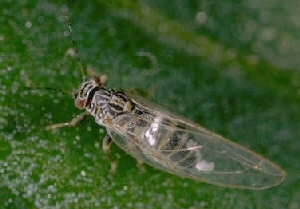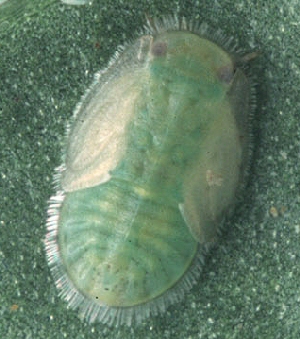Potato or Tomato Psyllid
 Scientific Name
Scientific Name
Bactericera (=Paratrioza) cockerelli
Host
Various solanaceous plants serve as hosts including tomato, potato and eggplant. Weed hosts include nightshade.
Symptoms
Adults and nymphs have piercing sucking mouthparts and feed primarily on leaves. Leaves are damaged by removal of nutrients from the plant and by a toxin injected by the insects during feeding. Leaves become curled and yellow or purple in response to the feeding damage. Damage can result in reduced yields and / or death of the plant.
Life Cycle
 Psyllids probably do not survive the winter in Oklahoma. Adults migrate into Oklahoma
in early spring and begin feeding and laying eggs. Eggs hatch in 3 to 8 days dependent
upon temperatures. Nymphs feed and mature through 5 instars in 15 to 20 days before
becoming adults.
Psyllids probably do not survive the winter in Oklahoma. Adults migrate into Oklahoma
in early spring and begin feeding and laying eggs. Eggs hatch in 3 to 8 days dependent
upon temperatures. Nymphs feed and mature through 5 instars in 15 to 20 days before
becoming adults.
Description
The adult psyllid is pale with dark bands across the body and looks like a miniature cicada. The adults are approximately 1/16 inch long with wings that fold 'roof like' over the body. The eggs are very small, light yellow colored, spindle-shaped and are suspended from leaves on stalks. Nymphs are very small, pale green and look like scales.
Control
Please contact your local county extension office for current information.
